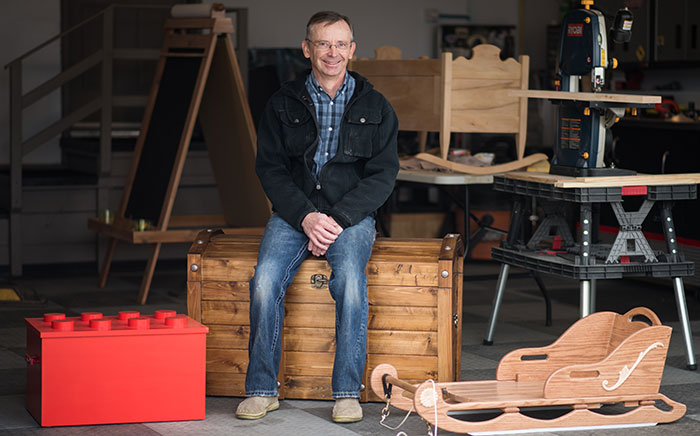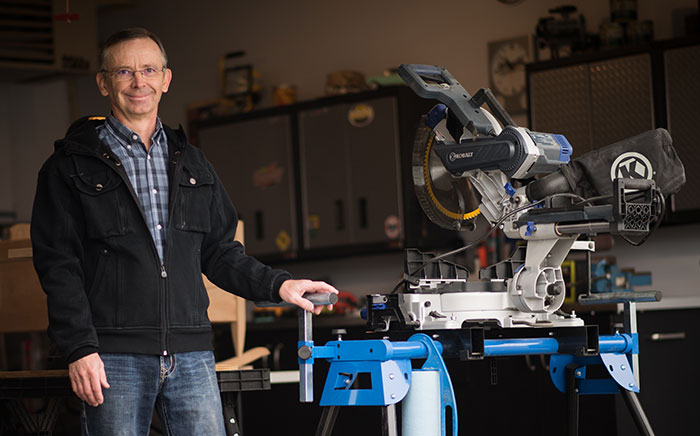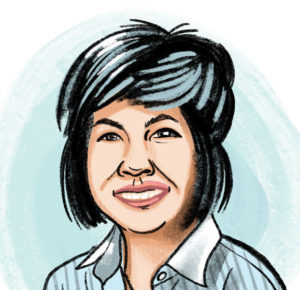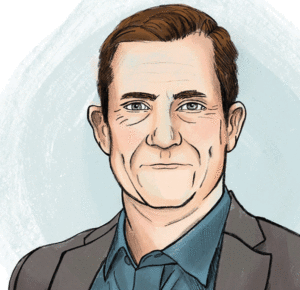
Happy Enders: After 40 years in healthcare as a nurse and nursing educator, more than 20 of those in cancer care, Wayne Enders will hang up his stethoscope in 2016.
Photograph by Buffy Goodman
Sitting in the sun-lit lobby of the Cross Cancer Institute, Wayne Enders watches as patients, families and colleagues pass by. Having worked out of the Cross for nearly a decade as a nursing educator with the province’s Community Oncology Program, he is all too familiar with life in the hospital.
“The true effect of a community oncology nurse can be seen in Wayne and the differences that he made in his community. He paved the way for the rest of us,” says Tanya Hines.
“The nurses, the doctors and all the staff in cancer care make a huge difference,” Enders says. “And sometimes I don’t even think they realize it. That’s what attracts me to working in oncology, we do make a difference every day.”
Enders has dedicated his entire professional life to patient care and nursing education. Now, after more than four decades in health care, he is about to embark upon a new adventure. Making the decision to retire in 2016 was not easy, but it is time for a well-deserved break for Enders. He was one of the first nurses to become involved in the Community Oncology Program almost 20 years ago, so his retirement will mark the end of an era.
Though soft-spoken, Enders’ passion for nursing, education and oncology is instantly apparent when he discusses his experiences over the last 20 years in community cancer care. When the first Community Cancer Centre first opened in Camrose in 1996, Enders was working in the emergency department of the hospital in Barrhead. Community oncology was a new concept, and eventually grew from one clinic in Camrose to include the communities of Bonnyville and Barrhead as well. When he learned that the project would include Barrhead, Enders was intrigued.
“I decided that it was an opportunity that I wanted to explore. Once I got into it, I realized oncology is quite an amazing place to work,” he says. “It’s all about hope, innovation and providing really good care. It’s a pleasure and a privilege to care for these people. They face some uncertainties and difficulties in their lives while experiencing cancer and you know, it’s just inspiring.”
Enders worked as the primary nurse in the Barrhead Community Cancer Centre for the next decade, working directly with patients and families each day. When the opportunity to work as a nurse educator within the Community Oncology Program became available, Enders was hesitant to leave his frontline job for a behind-the-scenes role. After much deliberation, he decided to make the change and began working out of the Cross Cancer Institute in 2006. Being away from patients was difficult at first, but eventually he found nursing education had its own rewards.
“What I miss most, and still to this day, is the constant contact with the patients. And I sorely missed that for a long time. I moved forward and evolved into this role, and found that I got my satisfaction and sense of self-worth from knowing that I could impart knowledge and skills onto new nurses coming into oncology. Knowing that they’re going to go on and care for those patients with high standards, compassion and commitment, that gave me fulfillment as well,” says Enders.
Though it may have been a difficult transition for Enders, colleagues in the Community Oncology Program are grateful to have had the opportunity to access his knowledge and expertise. Sarah Champ, the Screening for Distress coordinator at the Cross Cancer Institute, has worked closely with Enders for the past two years, and credits him with much of the knowledge she has acquired in that time.
“I’ve learned so much from him,” says Champ. “From basic knowledge of cancer and cancer treatments, really expanding to everything. He has taught me about everything from leadership to different ways to approach things and looking outside of the box.”

Over the last four decades, Enders has seen a considerable amount of change throughout Alberta’s healthcare system. He has come to accept the constant change that occurs in nursing, and has learned to embrace the positive effects the profession has had on community cancer care.
“When I started out in nursing, we still had glass bottles for intravenous. Over the years there has been a huge focus on both patient and staff safety. So, things evolve,” he says, “And the division of Community Oncology, which I have been so fortunate to be a part of, has evolved from just a few people to a significant, group of colleagues and professionals providing a tremendous amount of quality care to the people of rural Alberta.”
Enders’ down-to-earth, dedicated and passionate nature has made him a sought-after advisor for oncology nurses in the 11 community cancer centres and four regional cancer centres around the province.
“We call Wayne our guru,” says Tanya Hines, primary nurse for the Drayton Valley Community Cancer Centre. “He’s kind of the go-to guy for everything with us. He just has a vast amount of knowledge in oncology and the problems that we face away from the larger centres. The true effect of a community oncology nurse can be seen in Wayne and the differences that he made in his community. He paved the way for the rest of us.”
Since 2006, Enders has had an impact on countless nurses, and by extension, patients’ lives across the province. Each year, he spends weeks on the road, away from his family, bringing education to each of the centres around the province. These trips can be taxing on Enders’ private life, but professionally they more than make up for it by offering a chance to reconnect with nurses and the realities of community cancer care.
“Those are probably some of the best days, when we get to go out and be with the staff members and see what it’s like on the front line again,” he says, “We try and support them in the very best way that we can so that they can do their jobs and provide top quality care.”
“I’m very much about taking advantage of the strengths of the team members, and I’m privileged to work with an amazing team,” says Wayne Enders.
Enders and his colleagues try to visit each of the community cancer centres at least twice a year, usually in spring or fall, to bring continuing education to nurses around the province. The content ranges from new policies to changing procedures and education on new drugs available for patients. During the remainder of the year, Enders and his team dedicate their time to staying abreast of any new technologies, processes or care regimens that would be useful for nurses in the Community Cancer Program to learn about. They then use this ever-evolving information to update their educational materials and ensure that staff have access to any pertinent developments in the field.
“Health care changes by the minute. Technology and knowledge are moving so fast it’s difficult to try to keep up,” Enders says. “The fact is, within our small education team, we each kind of take a certain piece and we build on each other’s strengths. I’m very much about taking advantage of the strengths of the team members, and I’m privileged to work with an amazing team.”
With his departure set for less than a year from now, Enders’ team will need to work hard to find a replacement to fill in for his lost expertise. And though he will miss working with an amazing network of oncology healthcare providers, he is ready for the next phase to begin. A wide grin grows across his face when he thinks of the future.
“I have two young grandchildren and another one on the way,” he says proudly. “And I have many hobbies. So, I plan to be even busier than I am now.”


